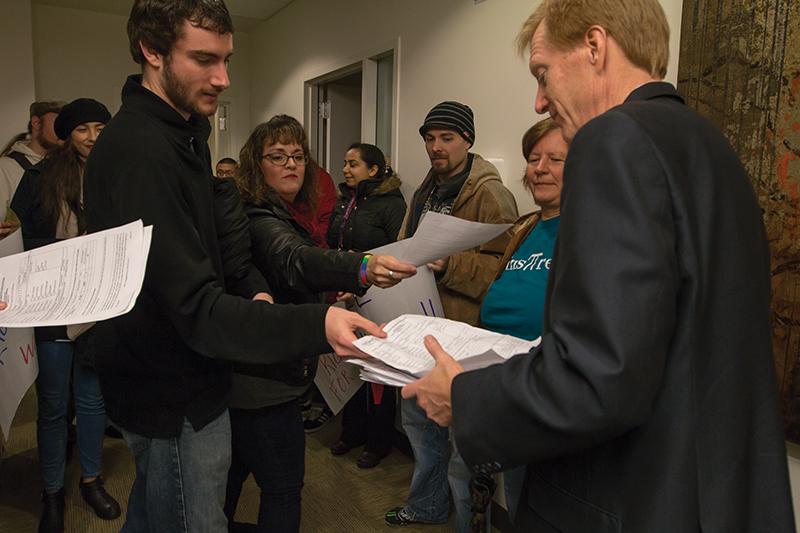
A group of graduate teaching assistants gathered in the lobby of the fourth-floor administrative offices of the Henry Madden Library on Tuesday, hoping to gain an audience with President Joseph Castro as part of efforts to obtain tuition fee waivers for graduate assistants.
Similar to a rally faculty held in October for a new collective-bargaining agreement, 15 graduate students, represented by the United Automobile, Aerospace, Agricultural Implement Workers of America (UAW), filled Castro’s lobby to turn in tuition fee waiver applications.
The graduate assistants hoped the symbolic gesture — done on the day of the application deadline — would help pave the way to fee waivers they said would help alleviate the financial burdens of pursuing a graduate degree.
But as the group packed inside one of the library’s elevators and made their way up to the fourth floor, they were met with a surprise. Castro, who was across campus attending a press conference at the Smittcamp Alumni House, wasn’t in his office.
The group, led by English graduate teaching assistant Emily Beals, instead turned in their faux applications to Dr. Michael Caldwell, associate vice president for faculty affairs.
Beals, a vice president for UAW Local 4123 — which represents the more than 8,000 academic student employees across the CSU system’s 23 campuses — said the union is the only bargaining unit at Fresno State that does not qualify for fee waivers.
“We are an important part of this campus, and we feel we need to be noticed,” Beals said, adding organizers were unaware of Castro’s schedule.
The union this semester has boosted efforts to increase its membership, a step organizers had said was important to lay groundwork for furthered talks with administration.
The union represents 65 percent of teaching assistants, instructional student assistants and graduate assistants at Fresno State, roughly about 250 students, Beals said.
The students who participated in Tuesday’s rally voiced concerns over lack of fair compensation for their services. Though each department varies in how it delegates responsibilities to its TAs, many take on roles similar to an adjunct professor.
Biology and physics TAs run the laboratory component of general education courses, while professors handle the lecture component. English TAs teach lower-level underclassman courses.
The union successfully fought for a 2 percent pay increase for UAW Local 4123 members this summer, which bumped hourly pay to $12.50. Teaching assistants’ reported hours are capped by the number of units or courses they teach — which equates to about seven hours per course.
Max Bright, a physics teaching assistant, said while he thinks the compensation TAs receive does not reflect the mount of work put in, it is still one of the better routes to take, both financially and professionally.
Still, tuition fee wavers — either partial or full — would go a long way to help ease the student loans Bright’s taken out for graduate school.
“I really hope it makes a difference, because we’ve lost several good physics TAs,” he said. “They don’t teach here anymore because they get better jobs teaching at community colleges.”
“I think we’re showing that we are important and valuable,” Beals added.
“We’ve got a lot of faculty support. Academic senate is supporting us. We have a lot of support from faculty, and I think it is going in the right direction. I’m optimistic.”




